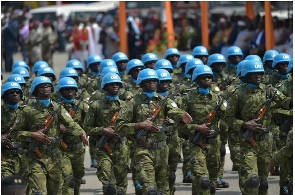A court in Mali has sentenced 46 soldiers from Ivory Coast to 20 years imprisonment for conspiring against the government, and three others to death in absentia.
The soldiers were also fined more than $3,000 and convicted of carrying and transporting weapons, Prosecutor General Ladji Sara said in a statement on Friday.
Forty-nine Ivorian soldiers were arrested at the airport in Mali’s capital Bamako in July, three of whom were later released. Their arrests led to a diplomatic row between the neighboring countries and widespread condemnation from regional allies.
The soldiers were detained when they went to work for Sahel Aviation Service, a private company contracted to work in Mali by the United Nations.
Mali’s military administration said the soldiers were acting as mercenaries, while Ivory Coast said they were part of a UN peacekeeping mission.
They were charged with attempting to undermine state security in August and convicted in a trial that began on Thursday and ended on Friday, ahead of a January 1 deadline set by the Economic Community of West African States (ECOWAS), the region’s main political and economic bloc, to release them or face sanctions.
Ivory Coast said its troops were being held hostage and has made repeated pleas for their release. The country announced last month that it would withdraw its remaining soldiers from the UN peacekeeping mission in Mali (MINUSMA).
One of Africa’s most volatile countries, Mali has for a decade relied on regional allies and peacekeepers to contain rebels who have killed thousands of people and taken over large areas of the central and northern regions.
Mali has little to gain from antagonizing a key neighbor, said Alexander Thurston, assistant professor of political science at the University of Cincinnati.
“The junta is compounding its isolation and adding to the likelihood that (the UN peacekeeping mission) will collapse,” he said.
The case has added to escalating tensions between Mali’s military authority and the international community.
The military authority’s leader, Colonel Assimi Goita, has faced growing isolation since he seized power in a coup two years ago and then failed to meet an international deadline for organizing democratic elections.
Goita has also allowed Russian mercenaries from the Wagner Group to help fight rebels linked to al-Qaeda and ISIL (ISIS).
The Russians came into Mali as the French and other regional forces left.
Amid growing tensions with the army, France withdrew its troops after nine years of operations in Mali against rebel groups.
In June, Malian authorities said they would not authorize the UN mission to investigate possible human rights violations in the country, including the deaths of more than 300 civilians earlier this year.
Africa News of Saturday, 31 December 2022
Source: aljazeera.com

















